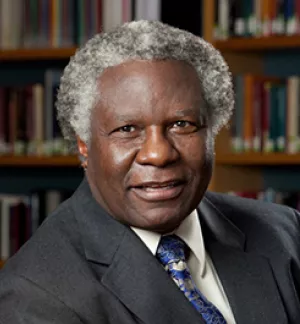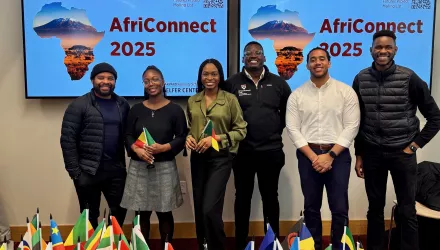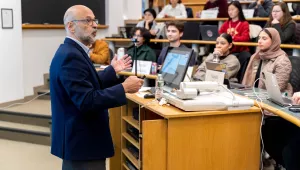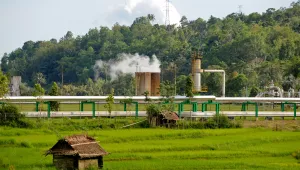Science and technology are being increasingly recognized as central features in international diplomacy. Much of the attention, however, has focused on how major industrialized countries and large emerging nations such as China, India, and Brazil use science and technology to advance their global competitiveness.
One of the most pressing global challenges, though, is how to leverage the power of new knowledge to help address the global economic and environmental challenges. New science and technology diplomacy responses are emerging from smaller industrialized nations working with developing countries.
Over the last decade countries such as Japan have been focusing on using science and technology diplomacy to address global environmental challenges. The bulk of Japan’s technology cooperation agreements have been with other industrialized countries. To a lesser extent the country has sought to integrate science and technology diplomacy in its official development assistance.
A number of industrialized countries have sought to strengthen science and technology diplomacy in their foreign services. The United States, for example, pioneered in creating an Office of Science and Technology Adviser to the Secretary of State. This office is part of a complex array of agencies that interact on scientific and technological matters on a continuous basis. The players include the American Association for the Advancement of Science, which runs a center that aims to use “science to build bridges between countries and to promote scientific cooperation as an essential element of foreign policy.”
In most diplomatic efforts nations seek to interact through institutions with comparable levels of competence. Decades of appeals through United Nations (UN) conferences to help build scientific and technological capacity in developing countries have yielded negligible results. The United Nations Secretary-General has failed to muster the political support needed to create an office of science and technology adviser. As a result, the UN is generally hobbled when dealing with complex issues involving science and technology. This is particularly critical given the growing recognition of the role of science and technology in most international negotiations ranging from disarmament to sustainable development.
New diplomatic leadership on using science and technology to solve global challenges is starting to emerge from smaller nations working closely with developing country partners. One of the most inspiring examples is the role of Slovenia in leveraging the power of frontier biopolymer research to address global challenges in fields such as agriculture, health, water, and environmental management.
Slovenia is a small nation with just over 2 million people. However, the country has a long tradition of scientific excellence that precedes its famed chemistry Nobel laureate Fritz Pregl. Its diplomatic reach in developing countries is limited. For example, Slovenia has only one embassy in Africa located in Egypt. But through its center of excellence in polymer research, PoliMat, Slovenia is working closely with African countries to build capacity in using scientific advances to solve economic and environmental problems.
“Polymers are large molecules made up of smaller repeating subunits. They offer great versatility and utility in a wide range of industries. They offer great potential to solving major economic and environmental problems in developing countries,” PoliMat CEO, Ms. Mateja Dermastia, explains.
Polymers are literally everywhere, from electronics to personal care products to food additives to medical materials. Biopolymers are polymers derived from natural biological and agricultural sources.
Plastics are commonplace synthetic polymers. Cotton and natural rubbers are examples of plant-based polymers. “All of the other polymers are chemically made from nonrenewable petroleum starting materials, and most do not degrade when exposed to the environment,” according to Professor Mabel Imbuga, Vice-Chancellor of Jomo Kenyatta University of Agriculture and Technology (JKUAT) in Kenya.
Nondegradable synthetic polymers pose a variety of ecological challenges as their accumulation poses a threat to the environment. “But biopolymers can serve as environmentally benign substitutes and therefore represent a rich opportunity for cooperation. Countries such as Slovenia can bring scientific and technological know-how while Africa can bring abundant biological resources as well young talent to support new partnerships,” says Ms. Dermastia.
The process of building the new field polymer diplomacy started with high-level political commitment from Slovenia and dedicated support from leading researchers in the field. In June 2012 Harvard University and Slovenia hosted the International Conference on Technology and Innovation for Global Development: Schumpeter and Polymer Research.
Addressing the conference, former President of Slovenia, Dr. Danilo Türk, stressed that “optimization of development is possible and that any optimization starts with science, technology and innovation.” Harvard University’s Professor Venkatesh Narayanamurti underscored the importance of investing in the engineering sciences as a foundation for prosperity.
The conference led to the establishment of an international network of polymer scientists and engineers from around the world. The network includes Austen BioInnovation Institute (Akron, USA), Biotechnology Center of Excellence Corporation (Waltham, USA), Harvard School of Engineering and Applied Sciences, Harvard Kennedy School, JKUAT, VDI/VDE Innovation (Germany) , PoliMat, and Polymer Competence Center Leoben (Austria). The network includes enterprises such as Aquafil Group (Slovenia), Kračun, MikroCaps (Slovenia), and Westminster Company (Kenya).
As a follow up to the conference, Slovenia—through PoliMat—has helped JKUAT to establish a Biopolymer Research Programme. The program will focus on how to leverage engineering advances in biopolymer research to solve global challenges in fields such as agriculture, health, and environmental management.
JKUAT operates as a thematic hub for basic sciences, technology, and innovation for the Pan African University established by the African Union, giving the program a continental mission. These efforts can help support the work of the Innovation Council that was recently established by the 20-member Common Market for Eastern and Southern Africa (COMESA).
Addressing the founding workshop, Professor Imbuga underscored the uniqueness of the diplomatic effort. She said Slovenia had brought “together over 50 participants drawn from various countries in Africa, Europe, and North America.” Equally important, she added, was the participation of 26 graduate students from the university.
One immediate use of biopolymer research, she said, is to protect the environment through the production of “biodegradable plastics.” She said that of the 212 tons of plastics used in Kenya’s capital city of Nairobi, only about 18% is retained or reused. Using biodegradable polymers would have significant ecological benefits.
The use of biopolymers extends to critical areas such as the slow release of fertilizers through encapsulation. Similar techniques can also be used in drug delivery, thereby reducing the quantity of chemicals used in agriculture and healthcare.
“Moreover, biopolymers can empower developing countries to utilize their agricultural resources to leapfrog into the biomedical revolution and contribute to advances in implantable medical devices,” Dr. Sujata Bhatia of the Harvard School of Engineering and Applied Sciences told the workshop. She highlighted examples such as naturally derived scaffolds for wound closure and tissue repair. “The major sources of energy, information, and structure in the human body are all biopolymers,” Dr. Bhatia emphasized.
This example illustrates the potential role that smaller nations working with developing country partners can have in promoting new science and technology diplomacy approaches. It underscores the role that political leadership, international networks of research institutes, national universities, and the private sector can play in forging new diplomatic relations among nations.
Slovenia and Kenya are inventing a form of science and technology diplomacy that is based on commitment to taking on global challenges irrespective of size and level of development. The cooperation points to a new future in which science and technology will increasingly become the bond that ties nations together in new diplomatic arrangements.
[NB: We welcome reposts. When doing so please limit capture to 150 words, cite this blog and author as original source, and provide link to: http://www.technologyandpolicy.org/2013/02/08/forging-new-diplomatic-bonds-through-science-and-technology/#.URUG4WfAl2k ]
Juma, Calestous. “Forging New Diplomatic Bonds Through Science and Technology.” February 8, 2013





